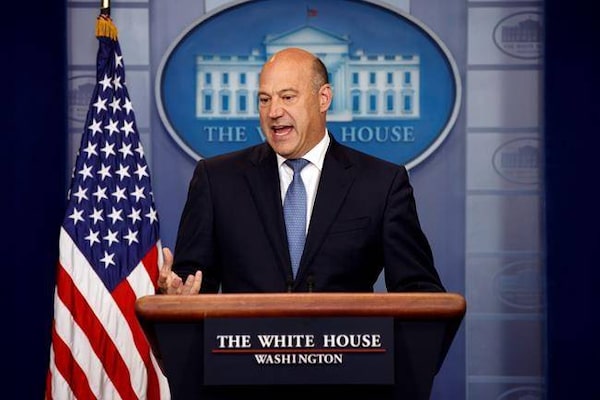
White House chief economic adviser Gary Cohn speaks during the daily press briefing, in Washington, on Sept. 28, 2017.Evan Vucci
Right up until the end, Gary Cohn was trying to change Donald Trump's mind.
This week, Mr. Cohn, the President's chief economic adviser, planned to host a meeting where executives could tell Mr. Trump how his proposed tariffs on steel and aluminum would harm their businesses.
But Mr. Cohn – a tough and savvy operator with decades of experience on Wall Street – was in a fight he could not win. On Tuesday, Mr. Cohn and the White House announced his resignation, making him the latest in a string of senior officials to head for the exits.
Mr. Cohn's departure will remove one of the most forceful proponents of free trade from the administration's internal deliberations. His resignation will also mean the disappearance of a significant interlocutor for Canadian officials inside the West Wing.
Over the past year, every major Canadian player involved in the renegotiation of the North American free-trade agreement had been in touch with Mr. Cohn, a government source said. That group included Katie Telford and Gerald Butts, top aides to Prime Minister Justin Trudeau; Foreign Affairs Minister Chrystia Freeland; and Brian Clow, the head of the U.S.-Canada relations unit in the Prime Minister's office.
More broadly, Mr. Cohn's retreat is likely to unsettle investors and corporate executives, who viewed him as a stabilizing force on economic policy. As long as Mr. Cohn was in place, went this line of thinking, Mr. Trump was unlikely to indulge in some of his more radical policy prescriptions. After Mr. Cohn's resignation became public early Tuesday evening, U.S. stock futures dipped sharply before recovering, but were down again early Wednesday.
Mr. Trump sought to put a positive spin on Mr. Cohn's departure, calling him a "rare talent" who had done a "superb job." The President wrote on Twitter that he would decide soon on a replacement for Mr. Cohn as director of the National Economic Council. "Many people wanting the job – will choose wisely!"
In recent days, a growing number of fellow Republicans have urged Mr. Trump to abandon his plan to impose tariffs. House Speaker Paul Ryan publicly broke with Mr. Trump over the tariffs this week, calling the proposal "extremely worrisome" and later urging the President to adopt a "more surgical approach." But Mr. Cohn's resignation suggests that Mr. Trump will not be dissuaded from his current course.
In some ways, it is surprising that Mr. Cohn, formerly the No. 2 executive at Goldman Sachs, did not leave sooner. A registered Democrat and a champion of Wall Street, Mr. Cohn was an awkward fit inside an administration brought to power by populist dissatisfaction. Allies of Stephen Bannon – another departed adviser – reportedly gave Mr. Cohn the epithet "Globalist Gary."
Mr. Cohn was on the brink of resigning last August after neo-Nazis and white supremacists marched in Charlottesville, Va., and Mr. Trump blamed "both sides" for the ensuing violence. Mr. Cohn reportedly drafted a resignation letter before changing his mind. Mr. Cohn told the Financial Times that the administration "can and must do better" in condemning hate groups. "As a Jewish American, I will not allow neo-Nazis ranting 'Jews will not replace us' to cause this Jew to leave his job."
Mr. Cohn stayed in his post to shepherd Mr. Trump's package of tax cuts through Congress at the end of last year. On Tuesday, both Mr. Cohn and Mr. Trump pointed to the US$1.5-trillion tax package, which delivered permanent rate decreases for corporations and increased the federal deficit, as the signal achievement of Mr. Cohn's 13-month tenure at the White House.
During his time in the administration, Mr. Cohn's influence ebbed and flowed. Last spring, he succeeded in delaying an immediate decision on steel tariffs and the matter was postponed for nearly a year. Last summer, he manoeuvred to put Peter Navarro, a hawkish trade adviser, under his supervision, limiting Mr. Navarro's access to Mr. Trump.
Mr. Cohn told Canadian and Mexican officials that he wanted a renegotiated NAFTA to focus on modernizing the deal – for instance by updating the agreement to include e-commerce – rather than inserting the sort of protectionist measures favoured by Mr. Trump and advisers in the "America First" camp.
At various points, Mr. Cohn appeared to be in the running for other government jobs. Last summer, Mr. Trump reportedly considered him as a potential candidate to become the next chair of the U.S. Federal Reserve (that post went instead to economist Jerome Powell). More recently, Mr. Trump discussed the possibility of him replacing John Kelly as the White House chief of staff, the New York Times reported.
On Tuesday afternoon, about two hours before Mr. Cohn's resignation became public, Mr. Trump alluded to the friction and staff turnover at the White House. "I like conflict, I like having two people with different points of view, and I certainly have that," he said at a news conference with the Prime Minister of Sweden. "There will be people that change," he continued. But "so many people want to come in."
Gary Cohn was Donald Trump's chief economic adviser until he resigned Tuesday.
 Adrian Morrow
Adrian Morrow